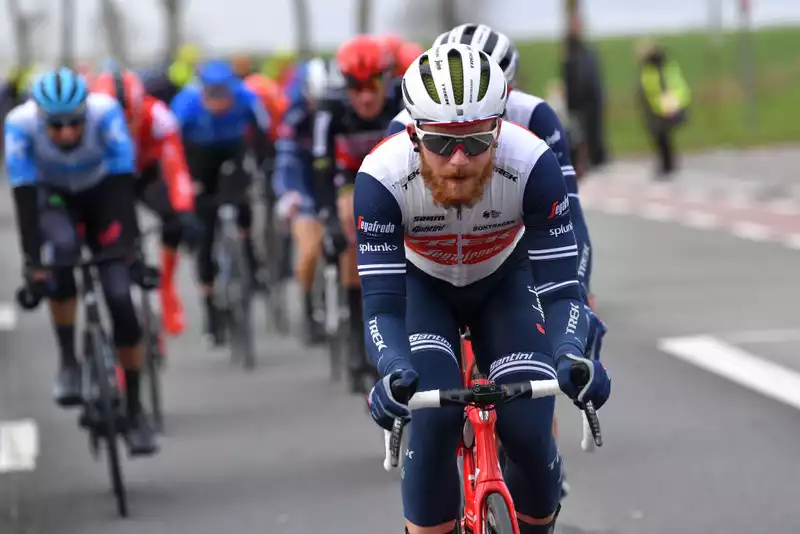When an 18-year-old is thrown into the World Tour, no matter how physically and mentally mature he appears to be, there are always teething problems.
After capping off a remarkable season and meteoric rise on the road with a dominating victory in the road race at the Junior World Championships, Quinn Simmons jumped through the U23 ranks and jumped onto the World Tour in 2020 with Trek Segafredo.
He had plenty of time to get his feet wet, as a coronavirus outbreak interrupted his racing for nearly five months.
"I was stressed about everything, doing every ride perfectly, eating every meal perfectly," he told Cycling News this week.
Simmons first supported Matteo Moschetti in the Challenge Mallorca, winning two sprint wins, before finishing in the top 10 twice in the Tour de la Provence. However, his entry into the classics, where he is expected to be a big name in the future, was a disappointing one.
He competed in the Omloop Het Nieuwsblad, which was won by teammate Jasper Stuyven, followed by the Cune Brussel Cune and Le Samyn, but did not finish either.
"I went a little too heavy and paid the price for it. I got too caught up in the idea that as a Classics racer I had to be a big 80 kg racer, which meant I couldn't sprint uphill and in the uphills, which is my forte.
"When I woke up the morning of (Omloop), I knew I was a little out of shape, but I lied to myself and went out there.
Simmons will have a second chance to put these teething problems behind him when the neo-pro campaign resumes in two weeks at the Tour de Pollogne. After bypassing a U.S.-European travel ban via the Spanish embassy, Simmons will travel to Europe from his home in Durango, Colorado, on Saturday, five months after the coronavirus pandemic broke out.
"At first I was really disappointed. It was mentally hard. I had trained all winter to have the fun of racing, and now it's gone and I have to train again. You don't train because you like training, you train because you like winning."
Nevertheless, Simmons feels that he "used the time well. While there were some intense training blocks, the majority of his time was spent reconnecting with his old life before he turned pro.
"I didn't even unpack my bike for two weeks. I just went skiing every day and mentally relaxed. I actually didn't touch my road bike for a month. Trek sent me a mountain bike, so I rode that mostly, doing gravel runs and long endurance rides."
Simmons did his first road training in April and spent the entire month of June at a training camp in Park City, Utah with friends from his junior days. He said, "With the team, I decided not to go to the team camp, because I didn't want to be a part of the team.
Still, he has continued to reach for wider tires and a less structured riding form, from "dirty Kanzeled" gravel rides to a week-long bikepacking trip through southern Colorado with his father.
"I was having as much fun on the bike as I used to. I enjoy road racing, but when I'm just riding, I prefer off-road."
However, that's not to say there aren't training benefits. Of his self-described "Rona Escape Tour," he said, "I was doing it six or seven hours a day. And when you do that on the bike, you get a lot stronger."
And he's not the only one who's done it.
So, as he prepares to board a plane to Europe, Simmons feels physically and mentally ready for the challenge ahead. After Poland, he will ride the Dwars Door Het Hageland and the Tour of Hungary. He had planned to return to North America for the Quebec and Montreal GPs, but those races were cancelled, so he will likely concentrate on the Tour of Luxembourg and the BinckBank Tour before the "spring" classics scheduled for October.
"I have the advantage of not having to worry about not knowing the level. It's a totally different game [from junior], but at least I know how it works.
As for the Classic, Simmons insisted that his role would be determined by his performance in the previous races, but he did not hide his ambition, even when teamed with Steuben and world champion Mads Pedersen.
"I don't think you can be a bike racer if you don't want to win. I don't consider myself a 19-year-old kid. Now I am a professional, I am on this team, I am in this race. Of course I want to learn from the other racers, but if I have the chance to put myself in a position to try to win, I have no hesitation in doing so.
"I am here to race. I'm not going to be satisfied with being a racer sitting in the peloton. I have to race and try to win. It's never enough to be a pack-filler and say throughout the year, 'I'm learning.'"
.

Comments